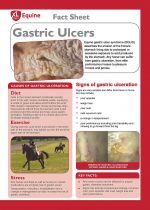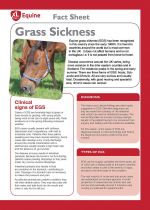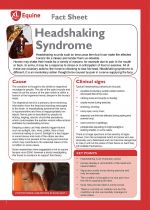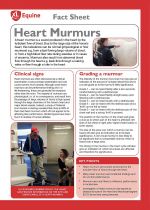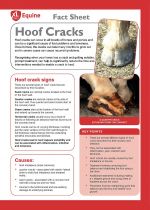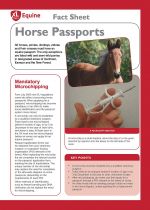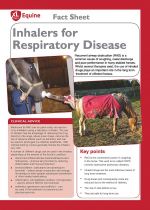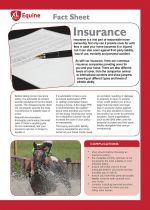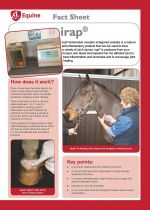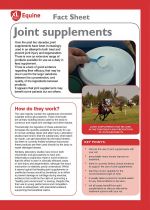Factsheets - Equine
Below are Word and PDF files of our Factsheets. You will need Adobe Reader to view the PDF files - if you need to download Adobe Reader please click here.
Please note: some of these factsheets are several pages long and are large files, so please be patient when downloading!
Gastric Ulcers
Equine gastric ulcer syndrome (EGUS) describes the erosion of the horse’s stomach lining due to prolonged or excessive exposure to acid produced by the stomach. Any horse can suffer from gastric ulceration, from elite performance horses to pleasure horses and ponies.
Grass Sickness
Equine grass sickness (EGS) has been recognised in this country since the early 1900’s. It is found in countries around the world but is most common in the UK. It does not affect humans and is not contagious i.e. it is not passed from horse to horse.
Disease occurrence around the UK varies, being more common in the drier eastern counties and in Scotland. The incidence peaks in the spring and early summer. There are three forms of EGS: Acute, Sub-acute and Chronic. All are very serious and usually fatal. Occasionally, with good nursing and specialist care, chronic cases can recover.
Headshaking Syndrome
Headshaking sounds such an innocuous term but it can make the affected horse’s life a misery and render them un-rideable.
Horses may shake their heads for a variety of reasons: for example due to pain in the mouth or back. In some, it may be a response to stress or in anticipation of food or exercise. All of these are voluntary actions; the horse is choosing to toss his head. Headshaking syndrome is different, it is an involuntary action thought to be caused by pain in a nerve supplying the face.
Heart Murmurs
A heart murmur is a sound produced in the heart by the turbulent flow of blood. Due to the large size of the horse’s heart, this turbulence can be normal (physiological or flow murmurs) e.g. from a fast flowing large volume of blood, or from a high blood flow rate during exercise or in cases of anaemia. Murmurs also result from abnormal blood flow through the heart e.g. back flow through a leaking valve or flow through a hole in the heart.
Hoof Cracks
Hoof cracks can occur in all breeds of horses and ponies and can be a significant cause of foot problems and lameness. Once formed, the cracks can take many months to grow out and in severe cases can cause recurrent problems.
Recognising when your horse has a crack and getting suitable, prompt treatment, can help to significantly reduce the time and interventions needed to enable a crack to heal.
Horse Passports
All horses, ponies, donkeys, zebras and their crosses must have an equine passport. The only exceptions are listed wild and semi wild ponies in designated areas of Dartmoor, Exmoor and the New Forest.
Inhalers for Respiratory Disease
Recurrent airway obstruction (RAO) is a common cause of coughing, nasal discharge and poor performance in many stabled horses. Whilst several therapies exist, the use of inhaled drugs plays an important role in the long term treatment of affected horses.
Insurance
Insurance is a vital part of responsible horse ownership. Not only can it provide cover for vet’s fees in case your horse becomes ill or injured, but it can also cover against third party liability, loss of use, mortality and personal accident.
As with car insurance, there are numerous insurance companies providing cover for you and your horse. There are also different levels of cover, from the companion animal to international eventers and show-jumpers, covering all different types and levels of athletic ability.
irap
irap® (interleukin receptor antagonist protein) is a natural anti-inflammatory product that can be used to treat a variety of joint injuries. irap® is produced from your horse’s own blood and injected into the affected joint to treat inflammation and lameness and to encourage joint healing.
Joint supplements
Over the past two decades, joint supplements have been increasingly used in an attempt to both treat and prevent joint injury and degeneration. There is now an extensive range of products available for use as a daily in feed supplement.
There is a lack of good evidence regarding their efficacy; that may be due in part to the large variations between the concentration, and quality, of the ingredients between products.
It appears that joint supplements may benefit some patients but not others.
